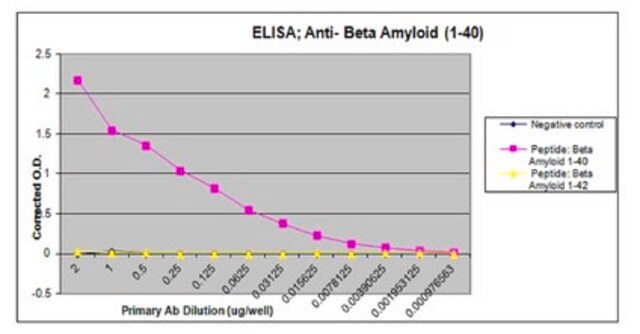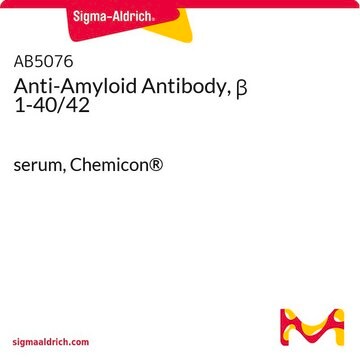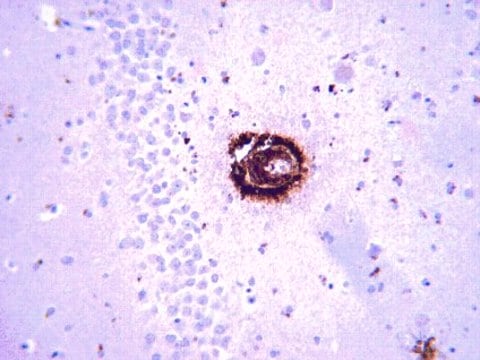MABN12
Anti-Amyloid β42 Antibody, clone G2-11
clone G2-11, from mouse
동의어(들):
Alzheimer disease, Alzheimer disease amyloid protein, Cerebral vascular amyloid peptide, Protease nexin-II, amyloid beta (A4) precursor protein, amyloid beta A4 protein, amyloid beta precursor protein, beta-amyloid peptide, human mRNA for amyloid A4 prec
로그인조직 및 계약 가격 보기
모든 사진(1)
About This Item
UNSPSC 코드:
12352203
eCl@ss:
32160702
NACRES:
NA.41
추천 제품
일반 설명
The cerebral and vascular plaques associated with Alzheimer′s disease (AD) are mainly composed of amyloid beta peptides (Aβ). Aβ is derived from cleavage of the amyloid precursor protein (APP) and varies in length from 39 to 43 amino acids. Aβ [1-40], Aβ [1-42], and Aβ [1-43] peptides result from cleavage of APP after residues 40, 42, and 43, respectively. The cleavage takes place by gamma-secretase during the last APP processing step. Aβ [1-40], [1-42] and [1-43] peptides are major constituents of the plaques and tangles that occur in AD. Aβ antibodies and peptides have been developed as tools for elucidating the biology of AD.
특이성
This antibody recognizes human Amyloid β42 at the C-terminus.
면역원
Epitope: C-terminus
KLH-conjugated linear peptide corresponding to the C-terminus of Amyloid β42.
애플리케이션
Anti-Amyloid β42 Antibody, clone G2-11 detects level of Amyloid β42 & has been published & validated for use in WB, WB, ELISA, IH.
ELISA: A representative lot of MABN12 antibody was used in a titer ELISA. Specificity of Amyloid beta peptide detection is displayed below.
Research Category
Neuroscience
Neuroscience
Research Sub Category
Neurodegenerative Diseases
Neurodegenerative Diseases
품질
Evaluated by Western Blot on human Alzheimer diseased brain tissue lysate.
Western Blot Analysis: 1 µg/ml of this antibody detected Amyloid β42 in 10 µg of human Alzheimer diseased brain tissue lysate.
Western Blot Analysis: 1 µg/ml of this antibody detected Amyloid β42 in 10 µg of human Alzheimer diseased brain tissue lysate.
표적 설명
4 kDa
물리적 형태
Format: Purified
Protein G Purified
Purified mouse monoclonal IgG1κ in buffer containing 0.1 M Tris-Glycine (pH 7.4, 150 mM NaCl) with 0.05% sodium azide.
저장 및 안정성
Stable for 1 year at 2-8°C from date of receipt.
분석 메모
Control
Human Alzheimer diseased brain tissue lysate
Human Alzheimer diseased brain tissue lysate
기타 정보
Concentration: Please refer to the Certificate of Analysis for the lot-specific concentration.
면책조항
Unless otherwise stated in our catalog or other company documentation accompanying the product(s), our products are intended for research use only and are not to be used for any other purpose, which includes but is not limited to, unauthorized commercial uses, in vitro diagnostic uses, ex vivo or in vivo therapeutic uses or any type of consumption or application to humans or animals.
Storage Class Code
12 - Non Combustible Liquids
WGK
WGK 1
Flash Point (°F)
Not applicable
Flash Point (°C)
Not applicable
시험 성적서(COA)
제품의 로트/배치 번호를 입력하여 시험 성적서(COA)을 검색하십시오. 로트 및 배치 번호는 제품 라벨에 있는 ‘로트’ 또는 ‘배치’라는 용어 뒤에서 찾을 수 있습니다.
Adriana Sofranko et al.
Particle and fibre toxicology, 19(1), 23-23 (2022-03-27)
There is an increasing concern about the neurotoxicity of engineered nanomaterials (NMs). To investigate the effects of subchronic oral exposures to SiO2 and CeO2 NMs on Alzheimer's disease (AD)-like pathology, 5xFAD transgenic mice and their C57BL/6J littermates were fed ad
Sophia Schedin-Weiss et al.
Alzheimer's research & therapy, 9(1), 57-57 (2017-08-03)
Increased levels of the pathogenic amyloid β-peptide (Aβ), released from its precursor by the transmembrane protease γ-secretase, are found in Alzheimer disease (AD) brains. Interestingly, monoamine oxidase B (MAO-B) activity is also increased in AD brain, but its role in
Tina Wahle et al.
Neurochemistry international, 138, 104755-104755 (2020-05-19)
Increasing evidence from toxicological and epidemiological studies indicates that the brain is an important target for ambient (ultrafine) particles. Disturbance of redox-homeostasis and inflammation in the brain are proposed as possible mechanisms that can contribute to neurotoxic and neurodegenerative effects.
Lisa Dolfe et al.
Journal of Alzheimer's disease reports, 2(1), 27-39 (2018-11-28)
Alzheimer's disease (AD) is the most common form of dementia and there is no successful treatment available. Evidence suggests that fibril formation of the amyloid β-peptide (Aβ) is a major underlying cause of AD, and treatment strategies that reduce the
Weigang Cui et al.
Molecular medicine reports, 22(2), 739-750 (2020-05-30)
Cognitive impairment and neuro‑inflammatory responses are the distinctive characteristics of Alzheimer's disease (AD). Tormentic acid (TA) is one of the major active components of Potentilla chinensis and has been demonstrated to have anti‑inflammatory properties. However, the potential effects of TA on
자사의 과학자팀은 생명 과학, 재료 과학, 화학 합성, 크로마토그래피, 분석 및 기타 많은 영역을 포함한 모든 과학 분야에 경험이 있습니다..
고객지원팀으로 연락바랍니다.








